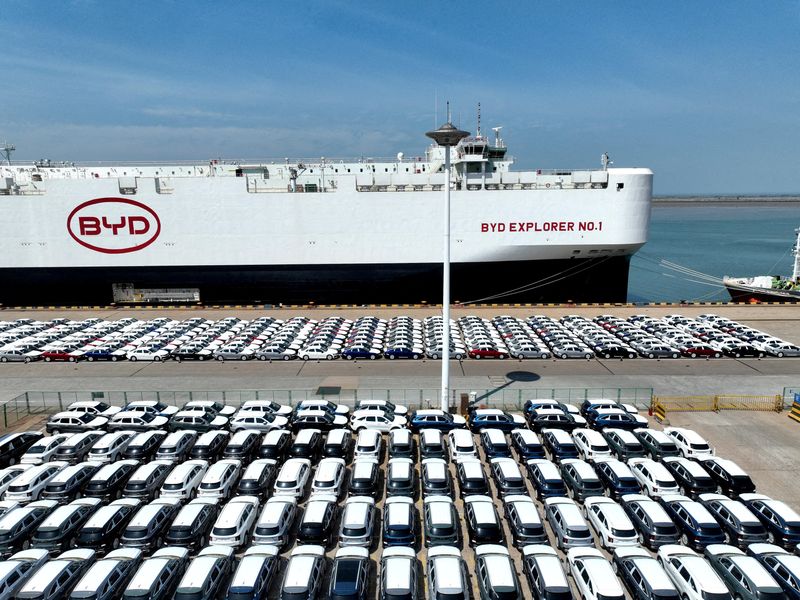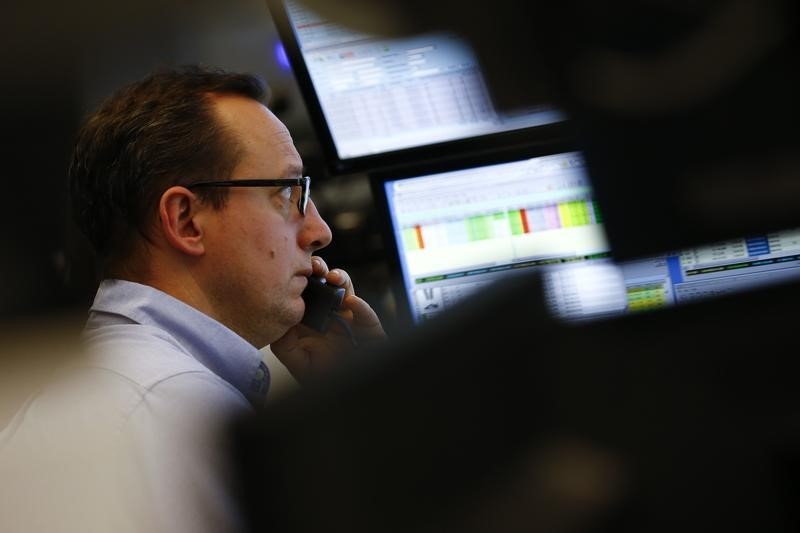By Philip Blenkinsop and Charlotte Van Campenhout
BRUSSELS (Reuters) -The European Union will impose tariffs of up to 37.6% on imports of electric vehicles made in China from Friday, EU officials said, increasing tensions with Beijing in Brussels’ biggest trade case yet.
However, there is a four-month period during which the tariffs are provisional and intensive talks between the two sides are expected to continue as Beijing threatens large-scale retaliation.
The European Commission’s provisional excise duties of between 17.4% and 37.6%, without retroactive effect, are intended to prevent a threatening flood of cheap electric cars built with state subsidies, according to President Ursula von der Leyen .
The rates, set out in a 208-page document published on Thursday, are virtually the same as those announced by the Commission on June 12. The executive branch made adjustments after companies discovered minor calculation errors in the initial disclosure.
Beijing then said it would take “all necessary measures” to protect Chinese interests.
These could include retaliatory tariffs on exports to China of products such as brandy or pork.
EU trade chief Valdis Dombrovskis said there was no reason for China to retaliate.
“Our goal is to ensure fair competition and a level playing field,” he said in an interview with Bloomberg.
The EU’s anti-subsidy investigation still has almost four months to go.
At the end of this, the Commission, the EU’s executive branch, could propose final rights, usually for five years, which would be voted on by EU members.
“Those discussions with China are ongoing and should there be a mutually beneficial solution, we can also find ways to ultimately not apply the tariffs,” Dombrovskis said.
“But it is very clear that this solution (should) solve the market disruption we are currently experiencing… and it must be competitive.”
China’s Commerce Ministry said on Thursday that the two sides have held several technical talks on tariffs on the issue so far.
“We hope that the European and Chinese sides will move in the same direction, show sincerity and move forward with the consultation process as soon as possible,” said He Yadong, a ministry spokesman.
BYD (SZ:) faces tariffs of 17.4%, Geely 19.9% and SAIC 37.6%, the EU said on Thursday. These are in addition to the standard 10% levy on car imports.
Companies deemed to cooperate in the anti-subsidy investigation, including Western automakers Tesla (NASDAQ:) and BMW (ETR:), will be subject to tariffs of 20.8% and those that do not cooperate to a tariff of 37.6% .
HIGHER PRICES
Chinese EV makers will have to decide whether to absorb the tariffs or raise their prices to cover the billions of dollars in new costs at Europe’s borders.
“Chinese automakers are desperate to expand sales outside China as the domestic price war takes its toll,” said Tu Le, founder of consultancy Sino Auto Insights.
Higher EV costs for European consumers would undermine the EU’s goal of being carbon neutral by 2050, opponents of the tariffs say.
Chinese brands MG and Nio (NYSE:) suggested on Thursday that they could raise prices in Europe later this year. Tesla said last month it planned to raise prices for its Model 3.
The prospect of tariffs could encourage Chinese automakers to invest in factories in Europe, even though labor and production costs are higher than in China.
On Thursday, Xpeng (NYSE:) became the latest EV maker to consider setting up production in the region to avoid the tariffs.
Europe’s largest carmaker Volkswagen (ETR:) was quick to criticize Thursday’s announcement.
“The negative consequences of this decision outweigh any benefits for the European and especially the German automotive industry,” a Volkswagen spokesperson said in a statement.
Auto industry executives have warned against the tariffs, fearing countermeasures that could hurt the competitiveness of their cars in China, where they are already struggling to keep up with a growing number of domestic competitors.
German car manufacturers achieved a third of their turnover in China last year.
The Commission estimates that the share of Chinese brands in the EU market has increased from less than 1% in 2019 to 8% and could reach 15% by 2025. Prices are typically 20% below those of EU-made models.
VARIOUS EU SUPPORT
European policymakers are keen to avoid a repeat of what happened with solar panels a decade ago, when the EU took limited action to curb Chinese imports and many European manufacturers went bankrupt. The EU launched its anti-subsidy investigation into Chinese electric vehicles last October.
The issue will be put to EU members in an advisory vote in coming weeks, the first official test of support in the Commission’s case, the first trade case of this kind.
Although the Commission launched its investigation without a complaint from the industry, members are unsure about whether to support the additional tariffs, highlighting the challenge for Brussels to gain support for the case.

The Chinese Passenger Car Association has said the tariffs will have a modest impact on the majority of Chinese companies.
The tariffs are much lower than the 100% tariff that Washington wants to apply to Chinese imports of electric vehicles from August.


